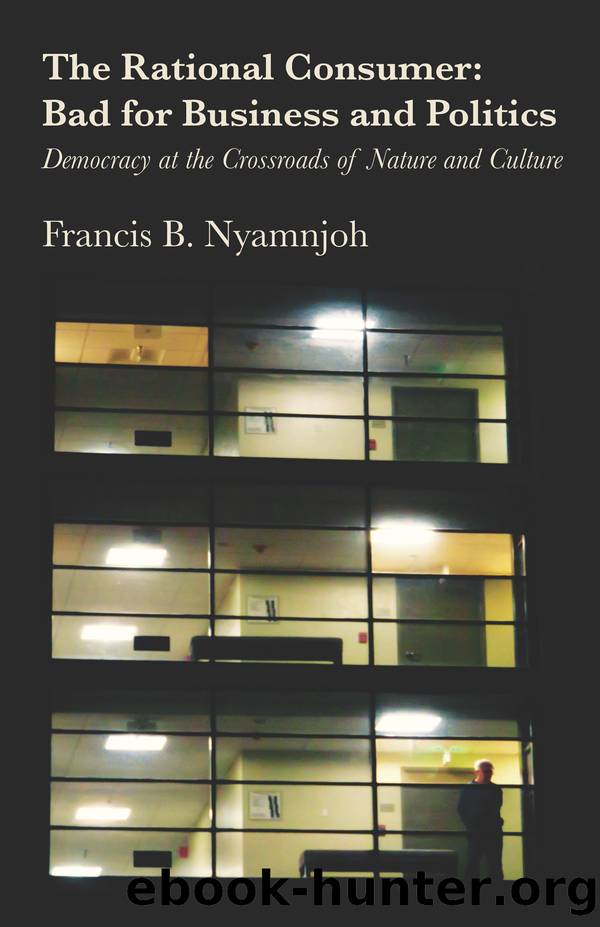The Rational Consumer: Bad for Business and Politics by Francis B. Nyamnjoh

Author:Francis B. Nyamnjoh
Language: eng
Format: epub
ISBN: 9789956550142
Publisher: Langaa Research & Publishing CIG
Published: 2018-08-15T00:00:00+00:00
6
Conclusion:
Beyond Impoverishing Dichotomies
To recapitulate, this essay has drawn on and fed into Adam Curtisâs 2002 documentary â The Century of the Self â to argue that human nature has been characterised in Freudian theory and practices inspired therefrom by dichotomous thinking. One of such dichotomies is the contrast between humans as intrinsically rational (pursuit of self-interest) and humans as emotive creatures (jeopardising self-interest). More notably, rationality has been understood as imposing the higher order reasoning self on the more desire-based and emotive self. This is akin to a disciplining process. This dichotomy is productive of a normative argument and attendant hierarchies. To be civilised is to be rational (i.e. to discipline our desires) and for the most part we think that this is the cornerstone of civilisation. However, the essay also argues that claims of rationality are not often consistent with action. To allow for a modernity informed by bringing irrationality and rationality into conversation is to disabuse ourselves of a tendency towards a cynical, exclusionary and opportunistic perception of rationality. Thus, rather than setting up this impossible standard, or giving up on it entirely, we should see human beings as fluid in how they respond to situations (rationally or presumably irrationally), whether or not one agrees that emotions are necessarily irrational and rationality necessarily devoid of emotion.
The essay has taken issue with the often unproblematised normative implications of the distinction between rationality and irrationality. It questions the value system attached to the distinction (desirable/undesirable) and not necessarily the distinction itself, for we could just as easily switch the content of the labels. In the prism of such a value-laden distinction, socio-economic and political stability/order appears to be a function not of rationality but irrationality. In the political sense, we believe rationality is in short supply and must be manufactured or engineered by an elite credited with being rational. The essay has illustrated these points with examples from the political and economic realms. In both political and economic contexts, the essay appeals to the Freudian belief that we can never fully be civilised because a pernicious range of desires lurks deep within us, and every civilisation carries along its debris and malcontents. Economically, capitalism has exploited this basic irrationality of human beings. The result is an economic system that reveals only a pretentious interest in consumers as rational agents making rational decisions in a rational market and in a democratic society as the rational political arena, par excellence. What the system really wants is irrational people, and it exploits these irrationalities with its predilection for absolutes. Politically, there has been cynicism towards the idea that the masses have an inherent rationality. Rather, rationality is represented as a privileged position only attained by a well-schooled and thoroughly socialised political elite and their hidden persuaders â psychoanalysts, public relations professionals and advertisers (Packard 1981[1957]) who are superbly qualified to actively engineer or manufacture consent with or without subliminal and seductive messaging (Bernays 1947; The F. W. Faxon Company 1951; Herman and Chomsky 1988).
Download
This site does not store any files on its server. We only index and link to content provided by other sites. Please contact the content providers to delete copyright contents if any and email us, we'll remove relevant links or contents immediately.
| Anthropology | Archaeology |
| Philosophy | Politics & Government |
| Social Sciences | Sociology |
| Women's Studies |
The Secret History by Donna Tartt(19052)
The Social Justice Warrior Handbook by Lisa De Pasquale(12187)
Thirteen Reasons Why by Jay Asher(8893)
This Is How You Lose Her by Junot Diaz(6877)
Weapons of Math Destruction by Cathy O'Neil(6264)
Zero to One by Peter Thiel(5786)
Beartown by Fredrik Backman(5737)
The Myth of the Strong Leader by Archie Brown(5499)
The Fire Next Time by James Baldwin(5431)
How Democracies Die by Steven Levitsky & Daniel Ziblatt(5215)
Promise Me, Dad by Joe Biden(5141)
Stone's Rules by Roger Stone(5081)
A Higher Loyalty: Truth, Lies, and Leadership by James Comey(4954)
100 Deadly Skills by Clint Emerson(4921)
Rise and Kill First by Ronen Bergman(4779)
Secrecy World by Jake Bernstein(4741)
The David Icke Guide to the Global Conspiracy (and how to end it) by David Icke(4706)
The Farm by Tom Rob Smith(4502)
The Doomsday Machine by Daniel Ellsberg(4484)
